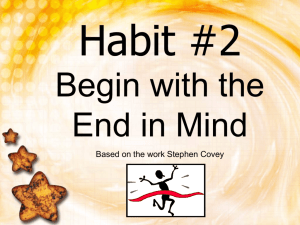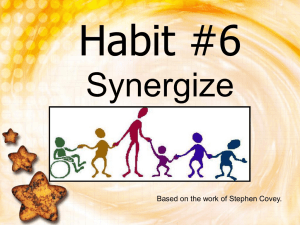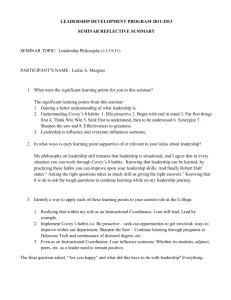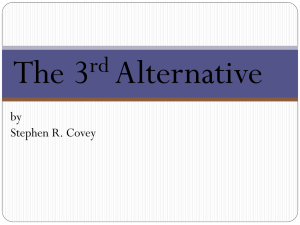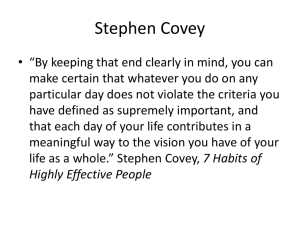8/24 Objectives
advertisement
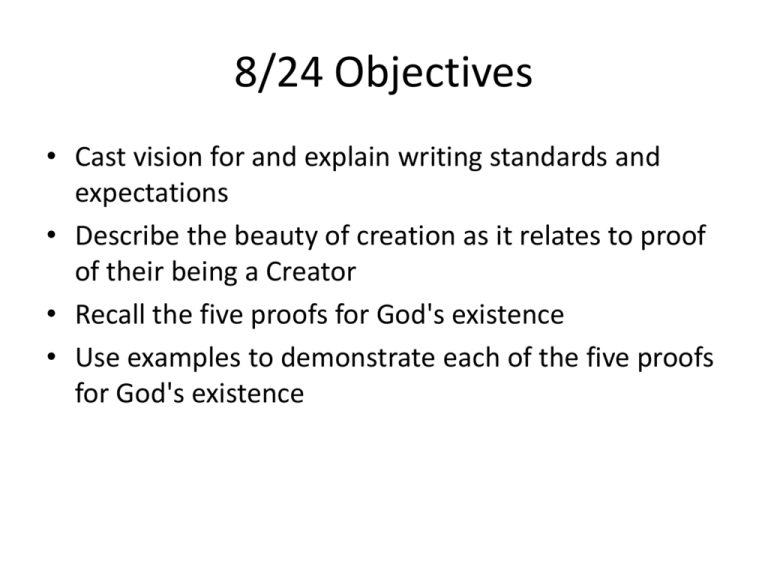
8/24 Objectives • Cast vision for and explain writing standards and expectations • Describe the beauty of creation as it relates to proof of their being a Creator • Recall the five proofs for God's existence • Use examples to demonstrate each of the five proofs for God's existence •SEEK 2013 • “Ever since the creation of the world his invisible nature, namely, his eternal power and deity, has been clearly perceived in the things that have been made.” Romans 1:20 The Five Proofs for god’s Existence 1. 2. 3. 4. 5. Argument from motion Argument from efficient causality Argument on possibility and necessity Argument on “degrees of perfection” Argument from design Argument from motion • “…Everything in the world that we experience and know undergoes change, proceeding from the potential to the actual. Everything moves or changes. Yet nothing moves or changes itself. Everything that moves must be moved by something already in motion. But this chain of motion cannot regress infinitely. An infinite chain of movers would not suffice to explain the motion. It must have a beginning that is unmoved. The unmoved prime mover is what we call God.” Scott Hahn, Reasons to Believe Argument from Efficient causality • “…Every effect has a cause. Still, the causal chain cannot be infinite any more than the chain of motion can. Yet neither can any cause in the sequence be considered an ultimate beginning; because, if we deny that first effect its own cause, we would nullify all subsequent effects. We cannot have an infinite regress in causes, so we must posit an uncaused first cause, and that first cause is what we call God.” Scott Hahn, Reasons to Believe •Tidal Wave Argument on possibility and necessity • “We observe that things are transitory; they receive their existence from something else. The things we see in the world do not arise suddenly out of nothing, but rather are derivative of other things, contingent upon the existence of other things. Yet, again, an infinite chain of derivation is unthinkable, absurd. It’s not enough to propose an infinite series of beings that, each and all, require a cause. If some beings are contingent, there must be an ultimate being that is neither transitory nor derivative, but necessary—necessary in and of itself. And it is that being we call God.” Scott Hahn, Reasons to Believe Argument on “degrees of perfection” • “St. Thomas observes that we all judge certain things to have a greater or lesser degree of perfection than others. We say something is more or less true, more or less good, and so on. Such relative measurements imply an absolute standard of measurement…But there must be some perfect standard against which all qualities are measured. That fullness of all perfection we call God.” Scott Hahn, Reasons to Believe versus Argument from design • “St. Thomas begins by noting that things that lack any intelligence still act in a purposeful way. They seem to have specific ends and observe certain patterns, certain “laws of the universe—the laws of gravity, thermodynamics, and so on—and these many laws all seem to work together in an orderly manner…when you study creation, you see evidence for design, and design points to a designer.” Scott Hahn, Reasons to Believe •Google Data Center 8/24 Objectives • Cast vision for and explain writing standards and expectations • Describe the beauty of creation as it relates to proof of their being a Creator • Recall the five proofs for God's existence • Use examples to demonstrate each of the five proofs for God's existence 8/25 objectives • Review past week's objectives • Define objective and subjective truth as it relates to how we, as individuals, view the world around us • Differentiate between character ethic and personality ethic, as well as primary traits and secondary traits • Define paradigm shift and importance using examples 8/18 Objectives • Retain how to survive transition, namely from summer vacation back to school • Explain three phases of transition: endings, neutral zone, new beginnings • Diagnose in which phase of transition you are currently 8/19 Objectives • Diagnose whether you have a fixed or growth mindset • Retain information about different types of spiritual gifts, charisms, gifts of leadership, and personalities • Differentiate between importance of gifts/talents versus effort and learning • Recall language to use when helping others with their growth mindset 8/24 Objectives • Cast vision for and explain writing standards and expectations • Describe the beauty of creation as it relates to proof of their being a Creator • Recall the five proofs for God's existence • Use examples to demonstrate each of the five proofs for God's existence 8/26 Objectives • Define objective and subjective truth as it relates to how we, as individuals, view the world around us • Differentiate between character ethic and personality ethic, as well as primary traits and secondary traits • Define paradigm shift and importance using examples • Subjective judgment vs. Objective reality •Archbishop Elect Robert Barron Grammar lesson • What is the subject of the sentence? What is the object of the sentence? • Mr. Rosser kicks the soccer ball. Objective reality Subjective judgment The 7 Habits of Highly Effective People What do you see? What is this saying? • “Woe to you, scribes and Pharisees, you hypocrites.You cleanse the outside of cup and dish,but inside they are full of plunder and self-indulgence.Blind Pharisee, cleanse first the inside of the cup,so that the outside also may be clean.” Matthew 23:25-26 Personality Ethic • Success is not a matter of interior virtue, but of function of exterior skills, traits, or appearances. Some examples are: • Public image • Attitudes and behaviors • Skills and techniques • What is incomplete about this? Character Ethic • “Only basic goodness gives life to technique.” Stephen Covey, The 7 Habits of Highly Effective People • What is goodness? Watch this video! Paradigm Shift • A paradigm is a “model, theory, perception, assumption, or frame of reference.” Stephen Covey, 7 Habits of Highly Effective People What do you see? Paradigm Shift • “Perhaps the most important insight to be gained from the perception demonstration is in the area of paradigm shifting, what we might call the “Aha!” experience when someone finally “sees” the composite picture in another way. The more bound a person is by the initial perception, the more powerful the “Aha!” experience is. It’s as though a light were suddenly turned on inside.” Stephen Covey, 7 Habits of Highly Effective People 8/27 Objectives • Define principle for purpose of class and give examples • Highlight principle of process and how it differs from a "quick fix" • Explain "habit" as it relates to being dependent, independent, and interdependent Principle • “Principles are guidelines for human conduct that are proven to have enduring, permanent value…One way to quickly grasp the self-evident nature of principles is to simply consider the absurdity of attempting to live an effective life based on their opposites.” Stephen Covey, 7 Habits of Highly Effective People Examples of those who live by opposite of correct principles Correct principles • • • • • Honesty Fairness Integrity Temperance Excellence Principle of process •Odell Beckham Jr. • “In all life, there are sequential stages of growth and development. A child learns to turn over, to sit up, to crawl, and then to walk and run. Each step is important and each one takes time.” Stephen Covey, 7 Habits of Highly Effective People • Other areas of life that this apply to are: • Listening well • Emotional intelligence • Administration • Patience What would you do? • “I’ve taken course after course of effective management training. I expect a lot out of my employees and I work hard to be friendly toward them and to treat them right. But I don’t feel any loyalty from them. I think if I were home sick for a day, they’d spend most of their time gabbing at the water fountain. Why can’t I train them to be independent and responsible—or find employees who can be?” Stephen Covey, 7 Habits of Highly Effective People • “There’s so much to do. And there’s never enough time. I feel pressured and hassled all day, every day, seven days a week. I’ve attended time management seminars and I’ve tried half dozen different planning systems. They’ve helped some, but I still don’t feel I’m living the happy productive, peaceful life I want to live.” Michael Hyatt, 7 Habits of Highly Effective People • “My marriage has gone flat. We don’t fight or anything; we just don’t love each other anymore. We’ve gone to counseling; we’ve tried a number of things, but we just can’t seem to rekindle the feeling we used to have.” Stephen Covey, 7 Habits of Highly Effective People • The personality ethic says there is a quick fix out there somewhere…a seminar I can attend, a book I can read, a new time management technique. The character ethic says that what may be wrong is part of my basic paradigm, my interior view of my employees, my time, and even my spouse. It adopts the principle of process that admits, though it will take time to look inside and develop proper principles and paradigms, it will benefit me infinitely more in the long run. Habit Defined • “For our purposes, we will define a habit as the intersection of knowledge, skill, and desire.” Stephen Covey, 7 Habits of Highly Effective People •Dilbert on Effective Listening Moving from dependence to interdependence • “Dependence is the paradigm of you—you take care of me; you come through for me; you didn’t come through; I blame you for the results. Independence is the paradigm of I—I can do it; I am responsible; I am self-reliant; I can choose. Interdependence is the paradigm of we—we can do it; we can cooperate; we can combine our talents and abilities and create something greater.” Stephen Covey, 7 Habits of Highly Effective People
